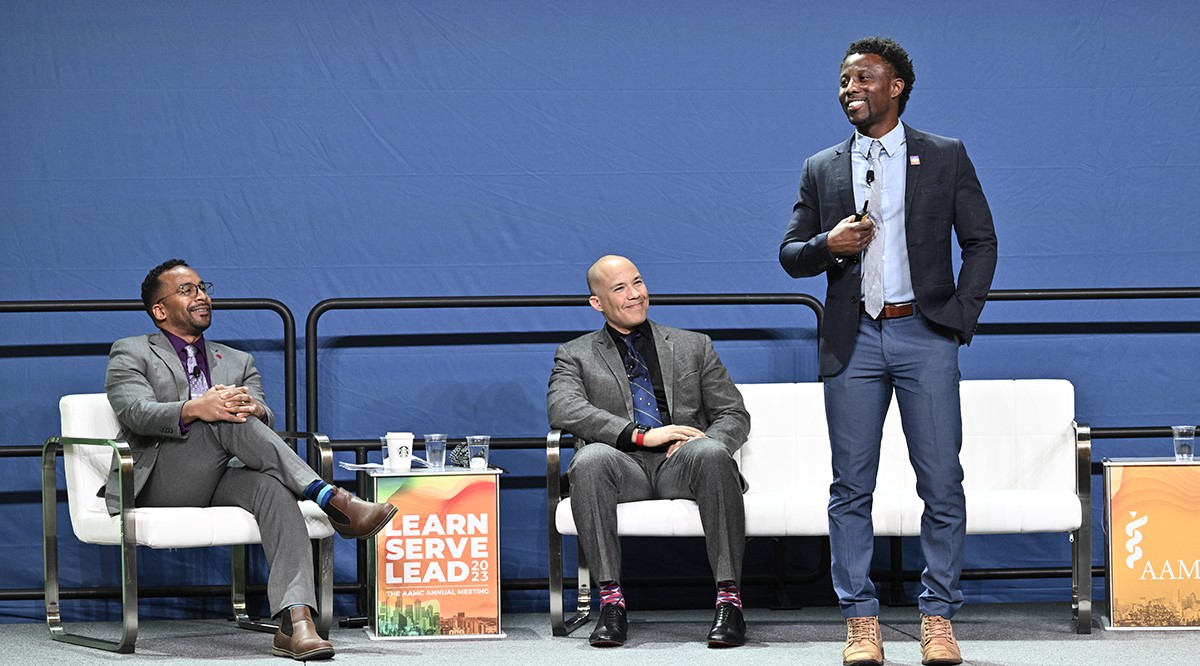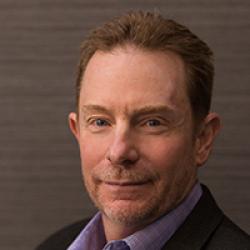
While growing up near Ferguson, Missouri, Stanley Andrisse recalls, “I got involved in selling drugs and making poor decisions at a very young age.” In his early 20s, he was sentenced to 10 years in prison on drug dealing charges. The prosecutor had asked for 20 years to life, “because he felt that I had no hope of changing.”
Today, Andrisse, PhD, MBA, is assistant professor of endocrinology at Howard University College of Medicine and Georgetown Medical Center, both in Washington, D.C., and directs a nonprofit that helps convicts succeed in careers and personal lives.
By the time he reached high school in Fresno, California, James Earl Harris Jr. recalls, “I was stealing cars, I was involved with gangs, I was on the verge of dropping out of high school.” Then his girlfriend got pregnant.
Today, Harris, MD, is chair of surgery and associate program director of surgical residency at Johns Hopkins Howard County General Hospital in Columbia, Maryland.
Andrisse and Harris overcame harsh beginnings and soared to success for numerous reasons, including their intelligence, drive, and resilience. Also essential to that success were mentors who stepped in at key moments to push them beyond their expectations and open locked doors, the men explained on Monday, Nov. 6 at Learn Serve Lead 2023: The AAMC Annual Meeting.
“That person was the voice in my ear that was saying, ‘You are not this career criminal as you've been labeled. You have potential,’” Andrisse told the audience at a session entitled, “Deeply Personal: Unlikely Paths to Science and Medicine and the Importance of Hope and Mentorship.”
“Without that mentor, I don’t think that I would be sitting here today.”
The role of mentors is especially important for populations who are underrepresented in medicine, said moderator Antwione Haywood, PhD, assistant dean of students at Indiana University School of Medicine.
“Those who grow up amid substance abuse, crime, substandard schooling and housing, with nonexistent role models, have two strikes against them before they even step up to the plate,” Haywood said. “Such factors disproportionately affect minoritized individuals, hampering their chances of achieving success.”
Mentors step in
Harris, the child of an African American father and Caucasian mother, did well in elementary school, but then family troubles sent his life downhill. In high school, he said, “I got into fights at least once a week” and skipped classes almost every day. When he was 14, his girlfriend got pregnant.
“It was a huge wake up call,” Harris said. “I saw the pathway that I was on. I thought, ‘Man, I need to get my act together.’”
He vowed to complete high school, primarily so that he could get a labor job and support his new family. One day, a counselor pulled him aside and asked, “What are your dreams?”
“No one had ever asked me that,” Harris said. Harris replied he always wanted to be a doctor, having been inspired by physicians who helped his grandmother, who suffered severe heart trouble, and by watching "The Cosby Show," which featured a successful Black family headed by a doctor and a lawyer.
The counselor connected Harris to an administrator at Fresno State University, who helped get Harris admitted. He struggled so much, however, that a counselor there tried to dampen his medical school ambitions, saying, “Maybe you could be a teacher if you’re lucky enough to graduate.”
Harris graduated, but given his low grades and MCAT® score, he knew that his application to the University of California, Los Angeles, David Geffen School of Medicine was a long shot. But pediatric cardiologist Josephine Isabel-Jones, MD, who was on an admissions committee for applicants with special challenges and backgrounds, championed his application.
“She saw that I’d gotten through a lot of hell, and she figured, well if this guy can get through that and still go for it, he deserves a shot,” Harris said. “She told me she had to really fight to get that spot for me.”
Isabel-Jones mentored Harris throughout medical school and beyond. If not for her and the mentorship provided by the high school counselor, Harris said, “I would not have gone to Fresno State. … I would not have gone to UCLA.”
Andrisse, the child of Haitian immigrants, always had ambitions to go to college. He began turning his life around in prison. There he read academic articles about diabetes, which had taken the life of his father.
“It was not because I had some idea of being where I am today,” Andrisse said. “It was more of a coping mechanism for dealing with losing my father.”
During that time, Andrisse kept in touch with a biology professor at St. Louis University whom he had met earlier. The professor “saw me using my skills and talents differently, and started investing in my potential,” Andrisse said.
When Andrisse was released from prison, the professor helped him apply to colleges — all of which rejected him, he said, except St. Louis University.
There Andrisse earned his PhD in physiology while also earning an MBA from Lindenwood University in Missouri. His experiences, including the value of his mentor, compelled him to co-found the nonprofit From Prison Cells to PhD, which is also the title of his memoir.
Haywood, the moderator, asked the two men how institutions “can provide holistic support in a way that would help a gentleman like yourself thrive?”
“Creating programs that help colleagues understand the Black experience of many people in communities across our country,” Andrisse said. “Trauma-informed training for folks in academia and medicine. If there’s more training around what that experience looks and feels like and there’s empathy towards that, there can be a better understanding of how to approach that person.”
Added Harris: “There’s also a big issue with microaggressions. People need more training on that. We need to stop having a tolerance for people who make jokes that are inappropriate, or who make people feel lesser. We need more leaders who are willing to step up and say, ‘This is not right.’”
